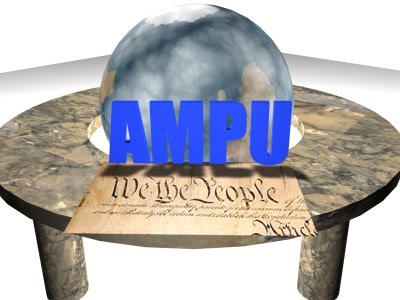

AMPU, or "A More Perfect Union" aims to provide online democracy in a way which is more advanced than either current representational democracy methods, or the oft-proposed alternative, "direct democracy".
Much more than a simple online voting system, AMPU aims to provide all citizens with the ability to manage their own affairs. By choosing areas of interest, you will be able to participate in those decisions, whilst leaving decisions which do not interest you to more interested parties. It stands to reason that those more interested parties who would likely be better informed anyway.
To this end, AMPU will not only provide advanced hybrid voting systems, but also the online community structure in which to discuss and deliberate on issues. The basic concept is similar to a bulletin board, but with the possibility to post decisions and tasks rather than just messages. Other things might also be posted, such as calendars, etc.
It is envisaged that AMPU might initially be used in small niche areas, such as management of small organisations (charities, schools, businesses, clubs, etc), and hopefully in small local governments.
As AMPU's areas of interests are hierarchically arranged, it will be possible to later merge many small local organisations as sub-trees in an overall management hierarchy. This will not only be useful to franchises, and national organisations but to global organisations and entire governments.
The AMPU project, recognising the need for an open system of government, is a Free Software project, adhering to GNU principles, both in word and in spirit. For the uninitiated, this essentially means that AMPU will be freely available to anyone who might want to make use of it, or to simply try it out.
One of the less well known aspects of the Free Software philosophy is that businesses should be equally free to use it. For example, the GNU Public License places importance on the right of businesses to alter software to suite their own needs, but to keep such changes private.
AMPU recognising the project's usefulness to business, and recognising the above philosophy, will also cater for business needs as much as possible.
Every organisation has it's secrets. Sometimes, it's a bad thing, but often it is simply things such as staff medical information and finances.
With AMPU, it will be possible to create a private, member-only sub-section of the tree hierarchy. All content of these private groups will be strongly encrypted. Furthermore, the method of encryption will be flexible, so that more advanced methods may be chosen as and when they become available. This allows organisations to have open staff discussions on most issues, yet to keep issues of delicacy to those who need to know. This is essential both to business adoption, and to government adoption, until governments shift towards more transparancy.
Moreover, it will be theoretically possible to have one large tree, containing every organisation, both public and private, within a nation. By making subsections of this tree member-only, certain groups can be as open and transparent as they feel is appropriate, without giving up other privacy. Each organisation will be communicating in a framework compatible with others', and efficiency demands would suggest more and more communication would happen directly between organisations within AMPU. Given these factors, it is envisaged that openness, transparancy, and co-operation would become much more commonplace under AMPU.
AMPU will be much more than a simple discussion and voting system. It is recognised that a major part of any decision lies within the evidence and resources being decided upon. Furthermore, it it recognised that organisations often have extensive documentation such as rules and publications to attend to.
In reorgnising these needs, AMPU will aim not only to provide discussion, but to provide document management and publication. For this discussion, we can consider many types of multimedia as "documents". Video footage might also be available, for example. AMPU will provide publication, editing, version management, auditing, and archiving for documents. In this way, AMPU will not only provide routes for discussion, but for planning and interoperation between sub-groups. Again, documents can be either publically available, or encrypted, and available only to those who need to know. Beyond simple storage, editing, etc.. AMPU will provide research facilities for finding documents of interest, and methods of converting documents into various formats suitable for your machine or software, or simply your needs at that moment. If, for example, you wanted to do a radio report, but the research material you find is a video, it would be possible to have the video automatically stripped, leaving just the sound you need. If you need financial information in an unusual format, the system could automatically generate that information from other data formats available.
There are simply many features to illustrate here, but I will point out one final feature for the moment. AMPU will be designed from the outset as an international system. It will be possible to publish documents in multiple languages without compromising on features. Using the same document conversion system alluded to above, AMPU will also be capable of automatic language translation, when suitable translations have not been provided. This is not only incredibly powerful for research, but has staggering implications for how we communicate today.
Please don't hesitate to contact me (Lee Braiden), if you want to know more.